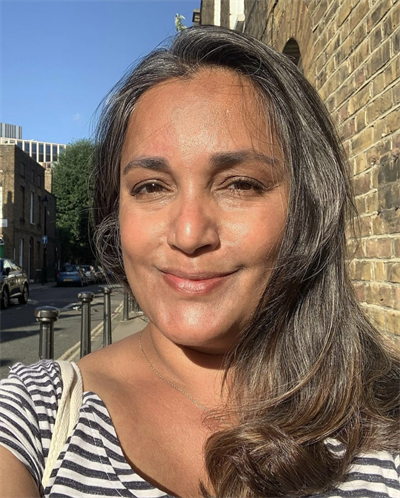Raksha Patel
Title
Senior Lecturer in Fine Art
College
University of the Arts London
Email address
Tags
Researcher Research

Biography
Raksha Patel works as an artist, writer, socially engaged practitioner and lecturer. She previously worked for the Learning Department at Tate Britain (1999-2011); The Learning Department of the British Museum (2015-2020) as an Artist in Residence at Whitechapel Gallery (2005) and Artist in Residence at The Pitzhanger Manor (2013).She has over two decades of teaching with a focus on inclusivity, anti-racism, and decolonising art-histories. Her pedagogical approach stems from her studio practice, research and lived experience.
The under-representation of works made by Black British, British South and East-Asian visual artists in UK public art collections led to the research project ‘British South-Asian Visual Art Post Cool Britannia’ for British Art Network. The research investigates the comparative invisibility of British South-Asian artists represented in national art collections. In 2021/22 Raksha co-led/chaired three public facing events in which artists from the South-Asian diaspora discussed issues relating to representation, inclusion and anti-racism through their studio-practice. The impetus to start this group came out of discussions on decolonising teaching between staff on BA Painting at Camberwell College of Arts. This project is supported and funded by British Art Network, The Paul Mellon Centre, Tate and the Arts Council of England.
In 2024 Raksha co-curated Standing Ground - Re-thinking the painted British landscape at Thames-Side Studio Gallery, London, September 2024. The exhibition showed 12 painters who investigate what the British landscape is today by challenging traditional notions of the rural idyll and English landscape painting and its connection to identity and nationhood.
"Landscape painting is a particularly freighted artistic genre, deeply connected to ideas of national identity. This is especially the case in Britain, where landscape painting is often regarded as the most significant historical national artistic achievement, and the landscapes of Gainsborough, Constable and Turner are sometimes seen as synonymous with British art altogether. Landscape painting is thus fundamental to narratives of British cultural identity, with the latter also fluid like paint itself. Its slippery and not always controllable quality takes on its own forms on the canvas – echoing humans’ failed attempts to subdue the natural world". (Dr Kate Nichols, Standing Ground catalogue essay, 2024).
The exhibiting artists were Madi Acharya-Baskerville, Said Adrus, Bhajan Hunjan, Frank Bowling, Trevor Burgess, Jai Chuhan, Jasmir Creed, Kimathi Donkor, Grant Foster, Bruno Grad, Azraa Motala and Raksha Patel. The exhibition is curated by Raksha Patel and Trevor Burgess.
A 36pp exhibition catalogue was produced to accompany this exhibition, this was generously supported and funded by British Art Network, which is jointly supported by Tate and Paul Mellon Centre. More can be read about this publication here https://britishartnetwork.org.uk/uncategorised/standing-ground-exhibition-catalogue/
Raksha was commissioned by UAL CSM Museum and Study Collection to produce a new artwork in response to the museums historic books on botany. She began by researching the social history of King’s Cross, specifically the development of the Granary Square area in which Central Saint Martins now sits. Much her of current work explores gentrification through portraits of estates and reflections on her experience of housing precarity exacerbated by rapid private development. Her painting Tulsi, the Goddess of King's Cross paid tribute to the King’s Cross communities that were displaced by the area’s development as well as exploring female resilience and power in plant form. This commission was supported by Diversity Matters grant from Museum Development London. The painting is in the UAL Museum Collection.
Raksha is currently working towards a new exhibition at The Midlands Arts Centre, Birmingham in 2026/27. Her drawings and paintings focus upon the lived experiences of the British South-Asian diaspora, migrant stories and histories as well as the nuanced nature of identity. The imagery in her work derives from in archives (both personal and public) that is merged with remembered accounts, which are re-enacted and photographed before translating into painting. Layered with imagery of the changing architectural landscape and natural spaces, her work intersects with race, gentrification and climate change from a post-colonial perspective.
Selected exhibitions: Nature 10, Kadriorg Gallery, Tallinn, Estonia (2025) Royal Academy Summer Exhibition (2025) Flux of Memory, Handbag Factory (2025) Standing Ground, Thames-Side Studio Gallery (2024) A Radical Decade, Rochdale Art Gallery in the 1980s, Touchstones Rochdale (2023), Trinity Buoy Wharf Drawing Prize (2023), Goddesses of Kings Cross, CSM Museum & Study Collection Gallery (2022) Home and Unhome, Sichuan Fine Arts Institute, Chongqing (2020) Stellatus Re-Visited, Site Gallery (2019) The Summer Exhibition, Royal Academy of Arts (2019 and 2020) Painting Now, Studio One Gallery (2017) Lives, Loves and Loss, National Trust, Fenton House, (2016) The Trouble with Painting Today, Pump House Gallery (2015), Forget-Me-Knot, Pitzhanger Manor Gallery (2013), Tradition and the Passing Down of Culture, Pump House Gallery, (2013) We were Trying to Make Sense, 1 Shantiroad, Bangalore (2013) Jerwood Drawing Prize (2011) The Mausoleum of Lost Objects, inIVA, (2008), Creative Connections, The Whitechapel Gallery (2005).